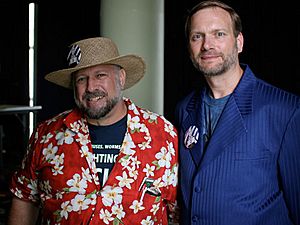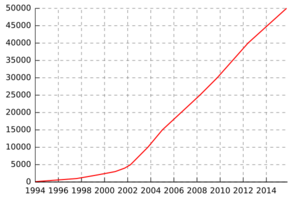Project Gutenberg facts for kids
Quick facts for kids Project Gutenberg |
|
|---|---|
| Established | December 1971 (first document posted) |
| Collection | |
| Size | Over 70,000 documents |
Project Gutenberg (often called PG) is a special project run by volunteers. They work to turn old books and important writings into digital files. Their main goal is to make free eBooks available to everyone.
It was started in 1971 by an American writer named Michael S. Hart. It's actually the oldest digital library in the world! Most of the books you'll find there are old classics or stories that are now in the public domain. This means their copyright has ended, so anyone can use them freely. All these digital books are free to download and can be read on almost any computer or device. As of August 2025, Project Gutenberg has over 75,999 free e-books in its collection.
The books are available in simple text files and other formats like HTML (for web pages), PDF, and EPUB (popular for e-readers). Most of the books are in English, but there are many in other languages too. Project Gutenberg also works with other groups, like Distributed Proofreaders, where volunteers help check scanned texts. The project is named after Johannes Gutenberg, who invented the printing press, making books available to many more people.
Contents
How Project Gutenberg Started

Project Gutenberg began in 1971 with a big idea from Michael S. Hart. He was a student at the University of Illinois at Urbana–Champaign. He got access to a huge computer called a Xerox Sigma V mainframe. This computer gave him almost unlimited computer time, which was worth a lot of money back then.
Hart wanted to use this amazing gift to do something valuable for everyone. His first goal was to make 10,000 of the most popular books available for free by the year 2000.
On July 4, 1971, Hart was inspired by a free printed copy of the United States Declaration of Independence. He decided to type the text into the computer. Then, he shared it with other users on the computer network.
This computer was one of only 15 connected to ARPANET. This network later grew into what we now call the Internet. Hart believed that one day, everyone would have access to computers. So, he wanted to make great books available to them for free in electronic form. The Declaration of Independence became the very first e-book for Project Gutenberg. He named the project after Johannes Gutenberg, the inventor who changed the world with his printing press.
By the mid-1990s, more volunteers joined Project Gutenberg. Michael Hart used to type all the texts himself. But by 1989, image scanners and special software called optical character recognition (OCR) got much better. This made it easier to scan books into digital files.
Later, Carnegie Mellon University helped manage the project's money. As more e-books were added, volunteers took over the daily tasks that Hart used to do. An Italian volunteer, Pietro Di Miceli, created the first Project Gutenberg website in 1994. He also helped build the online catalog. His work made the project very popular.
Since 2004, an improved online catalog has made it even easier to find and read Project Gutenberg books. Today, Project Gutenberg is hosted by ibiblio at the University of North Carolina at Chapel Hill. Michael Hart passed away on September 6, 2011, at age 64.
CD and DVD Projects
In August 2003, Project Gutenberg put about 600 of its best e-books onto a CD. People could download a digital copy of the CD. If they couldn't download it, they could ask to have a free copy mailed to them.
In December 2003, a DVD was created with almost 10,000 books. This was nearly the entire collection at the time. In early 2004, this DVD also became available by mail.
A new DVD was released in July 2007 with over 17,000 books. In April 2010, a special dual-layer DVD came out with almost 30,000 items.
Most of the CDs and DVDs were made by volunteers using recordable discs. However, the newer dual-layer DVDs were professionally made because it was cheaper. By October 2010, the project had mailed about 40,000 discs. As of 2017, they stopped mailing free CDs, but you can still download the digital copies.
What Books Are in the Collection?
As of August 2025, Project Gutenberg has over 75,999 items in its collection. They add more than 30 new e-books every week! Most of these are classic books from Western culture. This includes novels, poems, short stories, and plays. You can also find cookbooks, reference books, and old magazines.
The collection also has a few non-text items, like audio files, movies, and music. Most releases are in English, but many are in other languages too.
Project Gutenberg usually makes books available in simple plain text. This uses basic characters that almost any computer can read. Michael Hart believed this format would be readable far into the future. For books in languages like Chinese or Japanese, they use a different system called UTF-8 to show all the characters.
Volunteers can also submit books in other formats. HTML is common because it allows pictures and special text. Some people want more advanced formats, but Project Gutenberg generally avoids formats like PDF that are hard to edit. Since 2009, the Project Gutenberg catalog has also offered automatically created files like EPUB for e-readers.
Project Goals
Michael Hart said in 2004 that Project Gutenberg's goal is simple: "To encourage the creation and distribution of ebooks." He wanted to offer "as many e-books in as many formats as possible for the entire world to read in as many languages as possible." A project slogan is to "break down the bars of ignorance and illiteracy." This means volunteers want to keep spreading reading and appreciation for old books, just like public libraries started doing a long time ago.
Project Gutenberg is set up so that no one person controls everything. Volunteers choose what texts they want to work on. The collection is meant to last a very long time, so books won't be lost if something happens in one place. To make sure of this, the entire collection is regularly backed up and copied to servers in many different locations around the world.
Copyright Rules
Project Gutenberg is very careful about United States copyright law. They only add books to their collection after checking that the copyright has ended. They keep records of these checks. Project Gutenberg does not claim new copyright on the books they publish. Instead, they encourage people to freely copy and share them.
Most books in the Project Gutenberg collection are in the public domain under U.S. copyright law. This means anyone can use them without permission. There are also a few copyrighted books, like some by science fiction author Cory Doctorow. Project Gutenberg shares these with special permission from the author. These books might have a few more rules, but they are usually shared under Creative Commons licenses, which allow free use with some conditions.
"Project Gutenberg" is a special name, or trademark, of the organization. This name cannot be used if you sell or change the public domain books from the project. You can resell public domain books if you remove all mentions of Project Gutenberg. However, some volunteers feel it's not right to directly sell content that they worked hard to format for free.
Sometimes, Project Gutenberg's website has been blocked in certain countries due to copyright laws there. For example, it was blocked in Germany for a few years because some books, while free in the U.S., were still copyrighted in Germany. A similar situation happened in Italy.
Project Gutenberg Literary Archive Foundation
In 2000, a non-profit group called the Project Gutenberg Literary Archive Foundation, Inc. was started in Mississippi, United States. This group handles the project's legal needs. Donations to this foundation can be tax-deductible.
Gregory B. Newby, a professor and long-time Project Gutenberg volunteer, became the foundation's first leader in 2001.
Partners and Sister Projects
Project Gutenberg works with many partners and has "sister projects" around the world. These sister projects are independent groups that share the same goals. They have permission to use the "Project Gutenberg" name. They often focus on books from a specific country or in a certain language.
- ibiblio, at the University of North Carolina at Chapel Hill, hosts Project Gutenberg's main website.
- Distributed Proofreaders (DP) is a key partner. Started in 2000, DP lets many volunteers work together online to proofread scanned texts. This has greatly increased the number of books added to Project Gutenberg. As of 2018, books from DP made up almost two-thirds of Project Gutenberg's collection.
Some Sister Projects
- Project Gutenberg Australia: Focuses on books that are public domain in Australia, especially by Australian writers.
- Project Gutenberg Canada: A digital library for Canadian public domain books.
- Projekt Gutenberg-DE: A German project that has its own copyright rules.
- Project Gutenberg Europe: Aims to be a Project Gutenberg for all of Europe.
- Project Gutenberg Luxembourg: Publishes books mostly in Luxembourgish.
- Project Lönnrot: A Finnish project named after a Finnish writer.
- Project Gutenberg of the Philippines: Focuses on books about the Philippines and in Philippine languages.
- Project Gutenberg Russia (Rutenberg): Collects public domain books in Slavic languages, especially Russian.
- Project Gutenberg Self Publishing Portal: Allows people to submit texts that have never been published before.
- Project Gutenberg of Taiwan: Focuses on copyright-free books about Taiwan in English, Mandarin, and Taiwan-based languages.
- Projekt Runeberg: Focuses on Nordic literature.
- Distributed Proofreaders Canada: A separate group that helps proofread books for Canada.
- Faded Page: Another public domain book archive from Distributed Proofreaders Canada.
Related Projects
- The Internet Archive: A long-time backup site for Project Gutenberg.
- Librivox.org: A main partner for free audiobooks, often using texts from Project Gutenberg.
See also
 In Spanish: Proyecto Gutenberg para niños
In Spanish: Proyecto Gutenberg para niños
- Aozora Bunko
- Miguel de Cervantes Virtual Library
- Chinese Text Project
- Google Books
- HathiTrust
- Internet Archive
- LibriVox
- List of digital library projects
- Open Content Alliance
- Project Runeberg
- Runivers
- Sefaria
- Standard Ebooks
- Virtual volunteering
- Wikisource
 | Sharif Bey |
 | Hale Woodruff |
 | Richmond Barthé |
 | Purvis Young |


